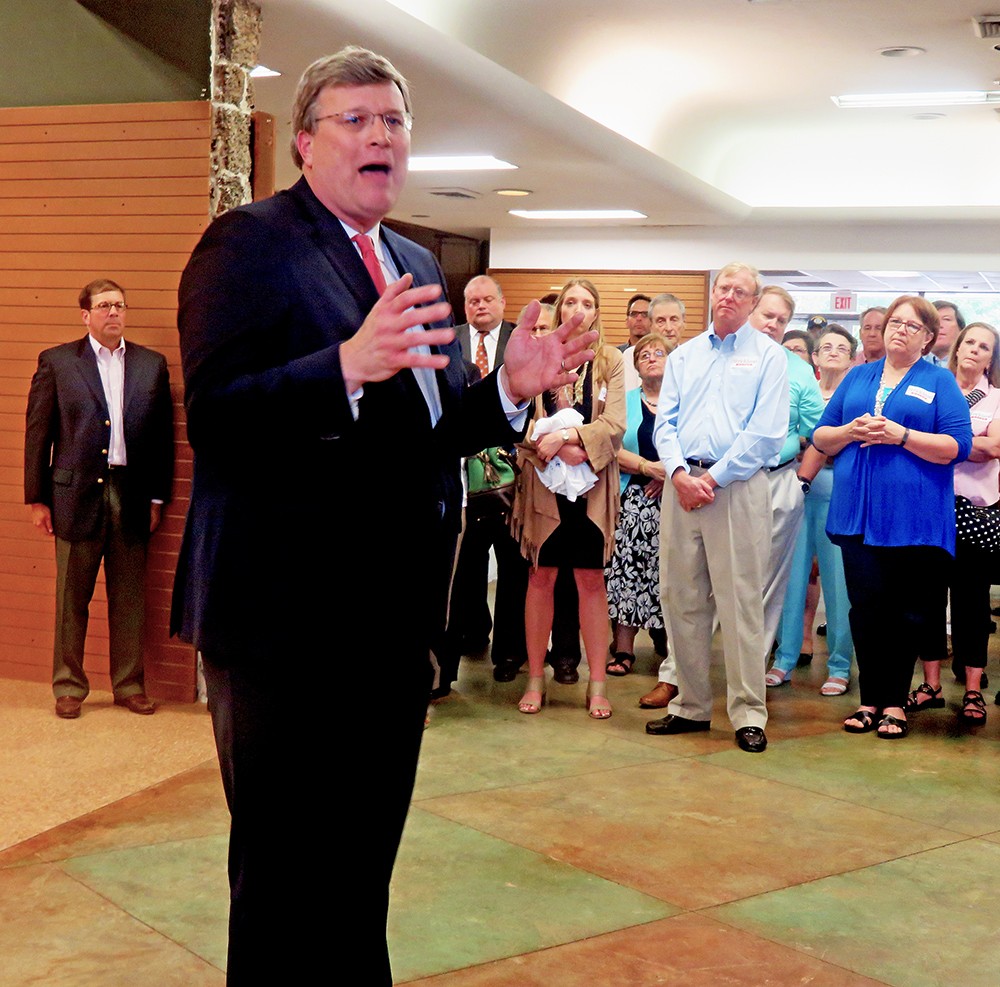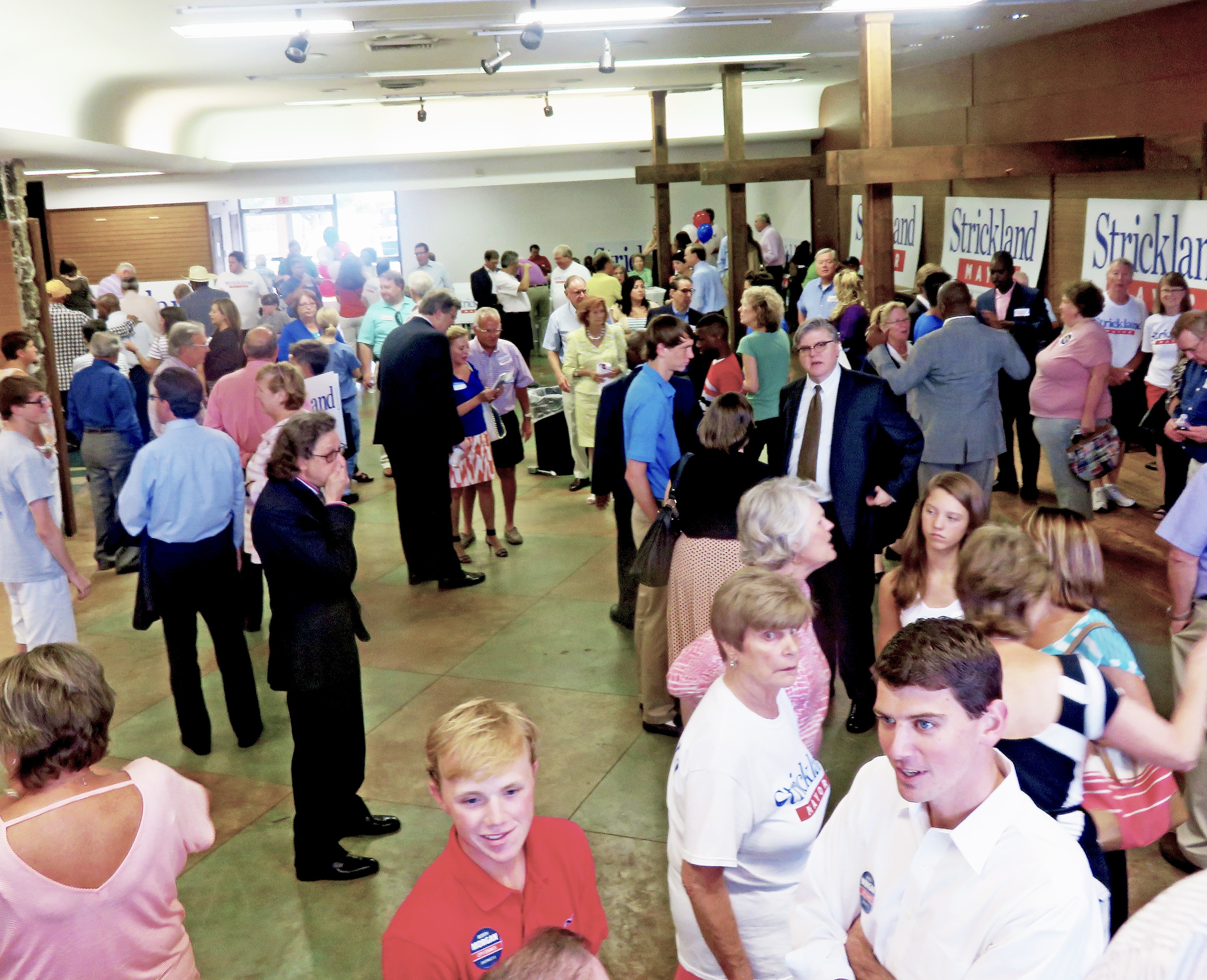 JB
JB
Strickland at Headquartes Opening
Jim Strickland has scads of support in his race for Mayor of Memphis. That was obvious from the enthusiastic crowd, numbering in the hundreds, that showed up for his Poplar Plaza headquarters opening Thursday evening.
Look around, and here and there you see what looks almost like a meeting of the Republican Steering Committee. GOP rank-and-file members are one undeniable source of support for the two-term City Councilman and former Shelby County Democratic chairman.
But there were no few of Strickland’s fellow Democrats in the crowd, too, especially those who, like Strickland himself, were most active several years back when the party was somewhat more racially balanced than it is now.
And there were whole families of folks who had the look of mere citizens, apolitical at heart but eager to check out a potential leader that might, just might have some of their interests at heart.
All of this is a way of saying that Strickland is strong with middle-class voters, and especially those in the Poplar Corridor. Strickland opened his remarks to the crowd by reminding them of the youth-mob outbreak that troubled Poplar Plaza last fall. It troubled him, too, he said, especially since his own residence was nearby, just on the other side of Poplar, which, all things considered, is Shelby County’s main drag.
“It did shake up the city, and it kind of shook me up, too,” he said.
Hence Strickland’s emphasis on public safety (including “zero tolerance for violent crime”), which he has announced is one of his key planks, and which he discoursed on again Thursday evening, Ridding the city of blight and making city officials publicly accountable are two others which got their fair share of attention. Fiscal solvency has been another major Strickland preoccupation in his Council years, and he more or less lets the memory of that one speak for itself on the stump.
To give the Councilman his props, he made the same basic speech to his headquarters crowd that he made a few weeks ago at the Zebra Lounge in Overton Square, at an event that specifically targeted black voters.
And that touches on the basic unknown of Strickland’s mayoral campaign. To what extent do he and his message resonate with Memphis’ African-American voters, who constitute a clear majority in the city?
To be utterly candid, the number of African Americans present in the jumbo crowd at Thursday night’s headquarters opening seemed at any given time to be numbered on the fingers of one hand. Or two hands at most. There was inner-city political broker Sidney Chism, Strickland’s longtime political ally. There was state Senator and former Councilman Lee Harris, his friend and former colleague. There was veteran political consultant Jerry Hall, a committed backer.
And there was James Harvey, the former Shelby County Commissioner, who served a term as chairman during his last year on that body. Until a few hours before, Harvey had been a candidate for Mayor himself, but had withdrawn earlier on Thursday, which was the final withdrawal date for candidates in the 2015 Memphis city election.
Strickland is as aware of the demographics of Memphis as anyone, and his choice of co-chairs for his campaign —Juvenile Court Clerk Joy Touliatos, a white Republican, and Kenneth Moody, a black Democrat — reflects that.
After Touliatos had made a brief speech in introduction of Strickland Thursday emphasizing the fact that “we need change,” Harvey was called upon, presumably because Moody was unavoidably absent, to deliver a second one. Harvey referenced what he said was Strickland’s desire to “represent everybody who is part of the community” and jested that “when I go out tomorrow, the first thing that I’m going to do is, I’m going to start waking up some more black folk, because we need some more black people that know you that’s not afraid of Big Jim because he’s a mean-looking white man.”
Which is one way of putting it
.
And Strickland, in his remarks at his headquarters opening, talked of remedies that were specific to the city’s underclass — Boys’ and Girls’ clubs, fully staffed city community centers, a pledge to support a private fund to help former convicts pay the necessary fees to restore their citizenship rights, grants and tax incentives to restore blighted neighborhoods.
Strickland clearly has a competitive campaign. The question remains: How much appeal does he have to the city’s majority-black voting population? And how much does he need, given consistent — though so far unverified — reports that Mayor A C Wharton’s support in that area is weakening?
The black vote is up for grabs. Strickland hopes to get his share. The Mayor still hopes to do well there. Councilman Harold Collins will certainly have a shot at it, and Mike Williams, as well.
Meanwhile, in the battle for the Poplar Corridor, where Mayor Wharton has always had strength, Strickland showed his muscle Thursday night.
 JB
JB
A look at Stickland’s crowd Thursday night